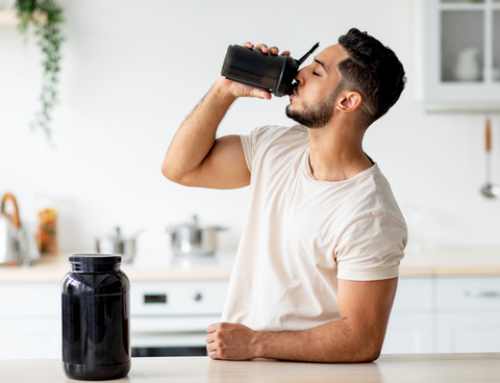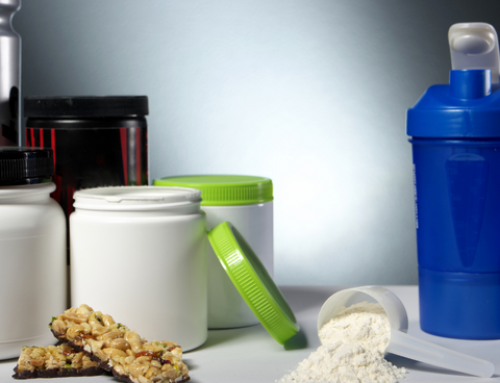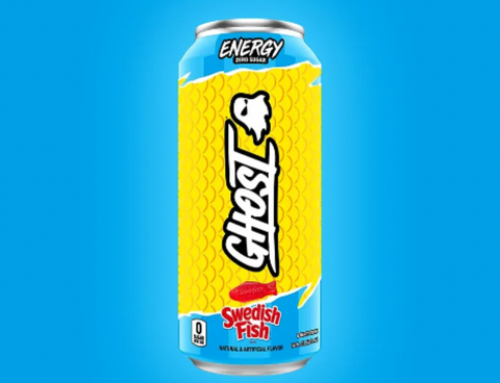The truth about caffeine
Dehydration compromises performance and puts unnecessary stress on the body.
By: Chad Zimmerman
Because of ephedra’s association with serious health conditions—including heat exhaustion, extreme dehydration and even death—the FDA, in April 2004, officially banned ephedra products. Dietary supplements that had used the substance for its fat loss and energy-boosting effects have since switched to caffeine to achieve the same results. Although safe when taken in moderation, too much caffeine can drastically hinder athletic performance.
Kathy Jordan is the general manager of the Dietary Supplements Good Manufacturing Practices Division of NSF International. Jordan’s division works to ensure product quality and safety for sport and dietary supplements made and distributed in the U.S.
She explains the effects of consuming too much caffeine: "Athletes need to know that caffeine is a diuretic; it causes fluid loss when taken in excess. Supplements that have many different or concentrated sources of caffeine must be taken with caution. In sports, dehydration is not an advantage. Dehydration compromises performance and puts unnecessary stress on the body. I don’t understand why athletes would put themselves in that position."
According to Jordan, the American Dietetic-Association recommends a daily caffeine limit of 250-300 milligrams, equivalent to two to three cups of coffee. However, many weight loss and energy-boosting supplements commonly prescribe two to three doses a day, each containing as many as 200 milligrams of caffeine, surpassing the ADA’s recommendation by 300-350 milligrams.
Some supplements contain more than one source of caffeine. Check out product labels, and you might see green tea, kola nuts or guarana. "These ingredients should be a red flag," Jordan says, "because the total caffeine content is not on the label, so you won’t know how many milligrams of caffeine you’re actually getting."
For the soccer player who can’t live without caffeine, precautions must be taken.
"If you’re going to consume caffeine, you need to be really cognizant of your fluid intake, and make sure you take in adequate amounts," Jordan warns. "Soccer is a sport where you sweat a lot. Players need to know that dehydration can compromise their performance and health. Severe dehydration can cause death, so it’s not something to be taken lightly."
Jordan advocates educating yourself about caffeine and paying attention to supplement labels. "It’s part of the responsibility of being an athlete," she says. "Most athletes work hard at training to be able to perform their sport. But they also need to pay attention to what they consume and what condition they are in when they consume them."
| 12 OZ. Beverage | MG of Caffeine |
| Red Bull (8.2 oz) | 80.0 |
| Jolt | 71.2 |
| Pepsi One | 55.5 |
| Mountain Dew (reg., diet, code red) | 55.0 |
| Diet Coke (lemon, lime, vanilla) | 45.6 |
| Dr. Pepper (reg., diet) | 41.0 |
| Diet Sunkist Orange | 41.0 |
| Mr. Pibb (reg., sugar free) | 40.0 |
| Sunkist Orange | 40.0 |
| Pepsi-Cola (reg., twist, cherry) | 37.5 |
| Diet Pepsi (cherry, twist) | 36.0 |
| Coke (reg., C2, cherry, lemon, vanilla) | 34.0 |
| Snapple Flavored Teas (reg. or diet) | 31.5 |
| A&W Creme Soda | 29.0 |
| Nestea Sweet Iced Tea | 26.5 |
| Nestea Unsweetened Iced Tea | 26.0 |
| Barq’s Root Beer | 23.0 |
| A&W Diet Creme Soda | 22.0 |
| Snapple Sweet Tea | 12.0 |
| Lipton Brisk, all varieties | 9.0 |
| Sprite | 0 |
| 7-Up | 0 |
| Mug Root Beer | 0 |
| Diet Barq’s Root Beer | 0 |
| Minute Maid Orange | 0 |
| A&W Root Beer | 0 |
| Slice | 0 |
| Sierra Mist | 0 |
| 8 OZ. Beverage | MG of Caffeine |
| Coffee, drip | 115-175 |
| Coffee, brewed | 80-135 |
| Coffee, espresso (2 ounces) | 100.0 |
| Coffee, instant | 65-100 |
| Tea, iced | 47.0 |
| Tea, brewed, imported brands (avg.) | 60.0 |
| Tea, brewed, U.S. brands (avg.) | 40.0 |
| Tea, instant | 30.0 |
| Tea, green | 15.0 |
| Hot cocoa | 14.0 |
| Decaf coffee, brewed | 3-4 |
| Decaf coffee, instant | 2-3 |
RECOMMENDED FOR YOU
MOST POPULAR
The truth about caffeine
Dehydration compromises performance and puts unnecessary stress on the body.
By: Chad Zimmerman
Because of ephedra’s association with serious health conditions—including heat exhaustion, extreme dehydration and even death—the FDA, in April 2004, officially banned ephedra products. Dietary supplements that had used the substance for its fat loss and energy-boosting effects have since switched to caffeine to achieve the same results. Although safe when taken in moderation, too much caffeine can drastically hinder athletic performance.
Kathy Jordan is the general manager of the Dietary Supplements Good Manufacturing Practices Division of NSF International. Jordan’s division works to ensure product quality and safety for sport and dietary supplements made and distributed in the U.S.
She explains the effects of consuming too much caffeine: "Athletes need to know that caffeine is a diuretic; it causes fluid loss when taken in excess. Supplements that have many different or concentrated sources of caffeine must be taken with caution. In sports, dehydration is not an advantage. Dehydration compromises performance and puts unnecessary stress on the body. I don’t understand why athletes would put themselves in that position."
According to Jordan, the American Dietetic-Association recommends a daily caffeine limit of 250-300 milligrams, equivalent to two to three cups of coffee. However, many weight loss and energy-boosting supplements commonly prescribe two to three doses a day, each containing as many as 200 milligrams of caffeine, surpassing the ADA’s recommendation by 300-350 milligrams.
Some supplements contain more than one source of caffeine. Check out product labels, and you might see green tea, kola nuts or guarana. "These ingredients should be a red flag," Jordan says, "because the total caffeine content is not on the label, so you won’t know how many milligrams of caffeine you’re actually getting."
For the soccer player who can’t live without caffeine, precautions must be taken.
"If you’re going to consume caffeine, you need to be really cognizant of your fluid intake, and make sure you take in adequate amounts," Jordan warns. "Soccer is a sport where you sweat a lot. Players need to know that dehydration can compromise their performance and health. Severe dehydration can cause death, so it’s not something to be taken lightly."
Jordan advocates educating yourself about caffeine and paying attention to supplement labels. "It’s part of the responsibility of being an athlete," she says. "Most athletes work hard at training to be able to perform their sport. But they also need to pay attention to what they consume and what condition they are in when they consume them."
| 12 OZ. Beverage | MG of Caffeine |
| Red Bull (8.2 oz) | 80.0 |
| Jolt | 71.2 |
| Pepsi One | 55.5 |
| Mountain Dew (reg., diet, code red) | 55.0 |
| Diet Coke (lemon, lime, vanilla) | 45.6 |
| Dr. Pepper (reg., diet) | 41.0 |
| Diet Sunkist Orange | 41.0 |
| Mr. Pibb (reg., sugar free) | 40.0 |
| Sunkist Orange | 40.0 |
| Pepsi-Cola (reg., twist, cherry) | 37.5 |
| Diet Pepsi (cherry, twist) | 36.0 |
| Coke (reg., C2, cherry, lemon, vanilla) | 34.0 |
| Snapple Flavored Teas (reg. or diet) | 31.5 |
| A&W Creme Soda | 29.0 |
| Nestea Sweet Iced Tea | 26.5 |
| Nestea Unsweetened Iced Tea | 26.0 |
| Barq’s Root Beer | 23.0 |
| A&W Diet Creme Soda | 22.0 |
| Snapple Sweet Tea | 12.0 |
| Lipton Brisk, all varieties | 9.0 |
| Sprite | 0 |
| 7-Up | 0 |
| Mug Root Beer | 0 |
| Diet Barq’s Root Beer | 0 |
| Minute Maid Orange | 0 |
| A&W Root Beer | 0 |
| Slice | 0 |
| Sierra Mist | 0 |
| 8 OZ. Beverage | MG of Caffeine |
| Coffee, drip | 115-175 |
| Coffee, brewed | 80-135 |
| Coffee, espresso (2 ounces) | 100.0 |
| Coffee, instant | 65-100 |
| Tea, iced | 47.0 |
| Tea, brewed, imported brands (avg.) | 60.0 |
| Tea, brewed, U.S. brands (avg.) | 40.0 |
| Tea, instant | 30.0 |
| Tea, green | 15.0 |
| Hot cocoa | 14.0 |
| Decaf coffee, brewed | 3-4 |
| Decaf coffee, instant | 2-3 |











